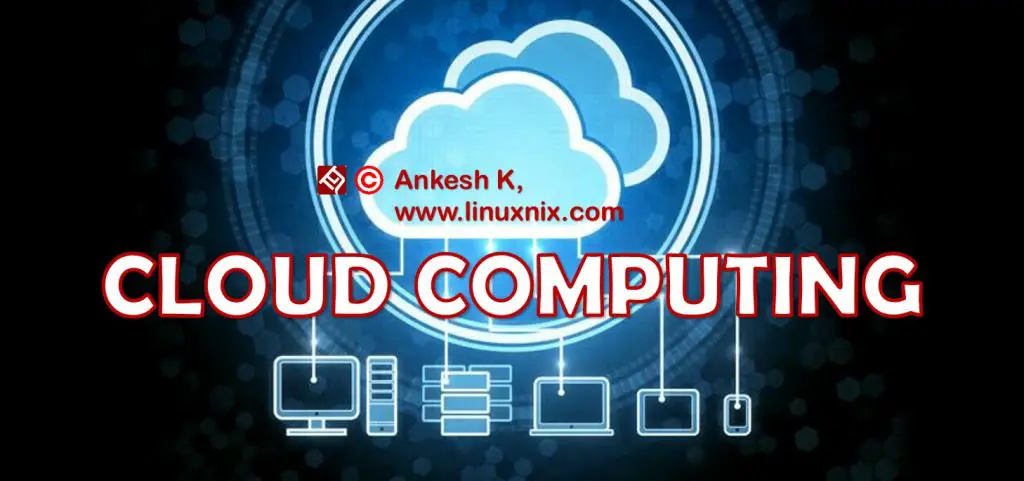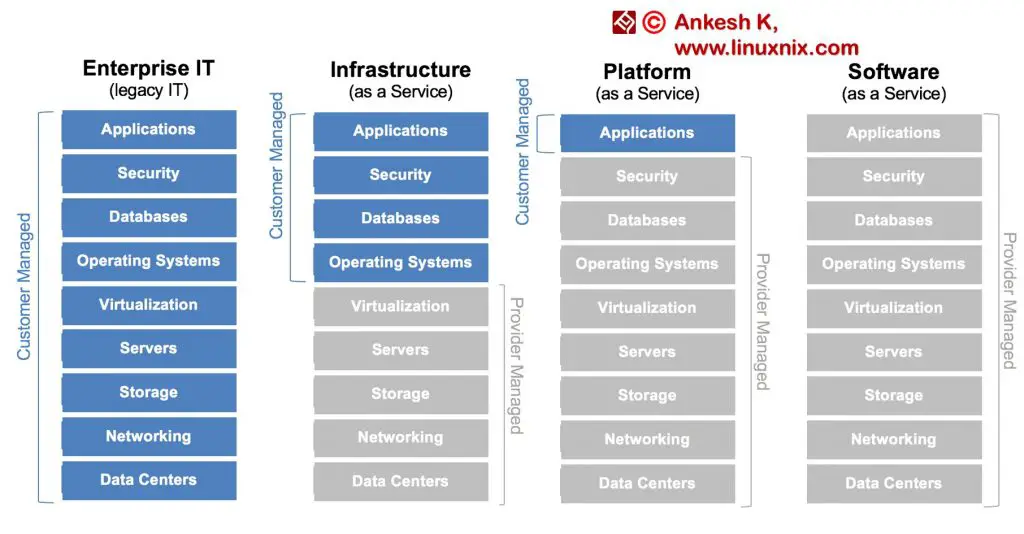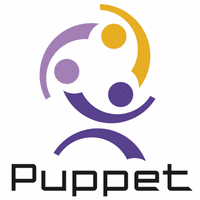Welcome to linuxnix.com. In this blog, we are going to understand what Cloud Computing is, its characteristics, types, advantages, and disadvantages. In the continuation of this blog, we are extending with some more features and creating your first infrastructure in AWS. To go through the blog, click here.
What is Cloud?
The term “Cloud” refers to a Network or the Internet. Cloud can provide services over public or private networks i.e. WAN, LAN or VPN.
What is Cloud Computing?
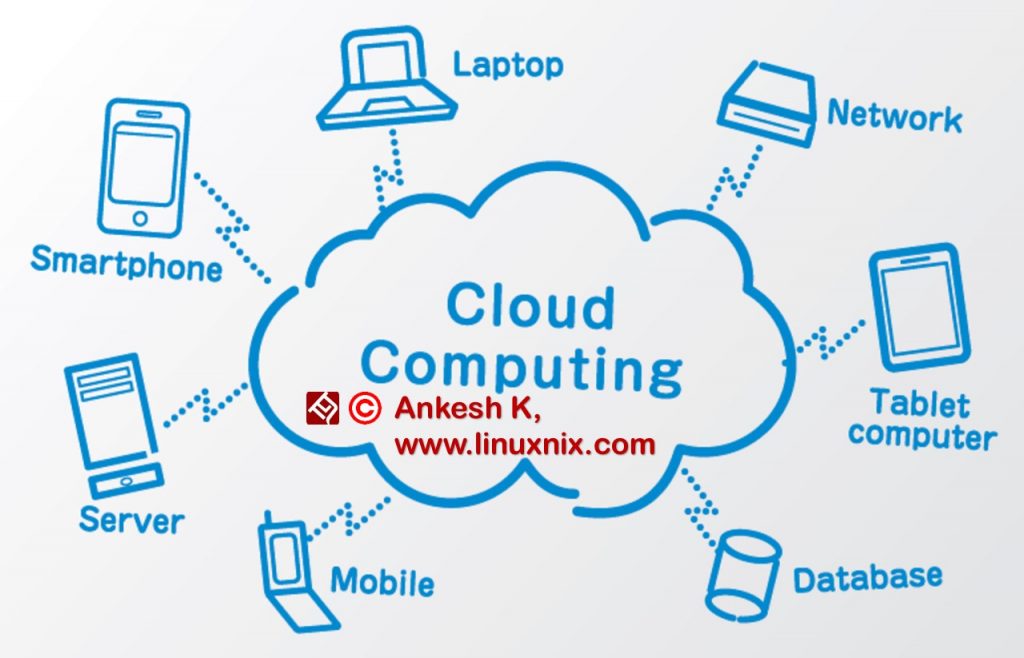
Characteristics of Cloud Computing
- On-demand Self Service – The customers can create an account in any of the cloud vendors and start using it without getting help from a sales agent.
- Global Network Access – This means you can access the resources sitting at any corner of the world just over the internet connection.
- Easy Scalability – You can easily scale your infrastructure up or down according to its usage.
- Measured Service – You need to pay the number of resources used in a particular span of time rather than buying the hardware and keeping it.
- Multi-Sharing – Multiple applications work more efficiently by sharing common infrastructure using Cloud Computing.
Types of Cloud Computing Deployment Models
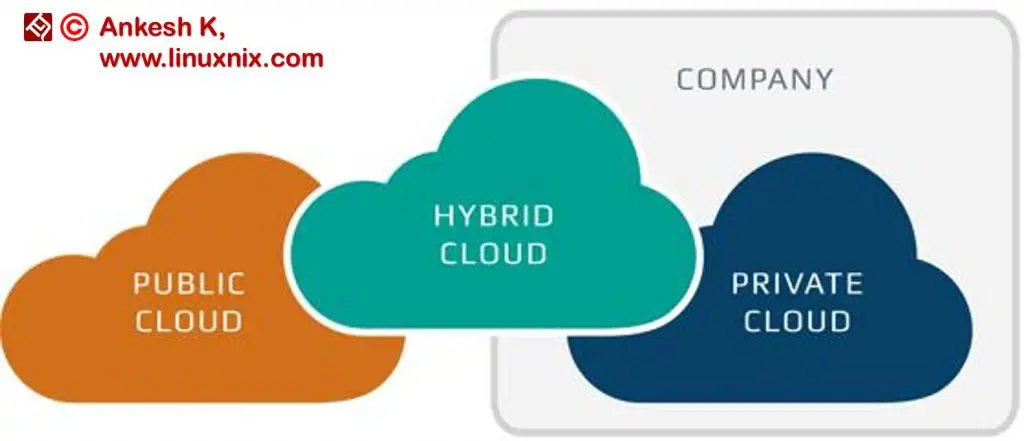
- Public Cloud – Public Clouds are owned by a third party cloud providers. They manage the resources, data, and services for you over the internet. You can manage your resources by a web console with a definite user access.
- Private Cloud – Private Cloud is the cloud resources owned by an organization or company. They have their servers located on the company’s own datacenters. Sometimes, these organizations used third-party companies to host their private cloud.
- Hybrid Cloud – Hybrid Cloud is the combination of Public and Private Clouds in the same boundary which allows their application to share between these two resources. This provides more flexibility and hence you can optimize your infrastructure.
Types of Cloud Computing Services
Most of the cloud computing services are of three types: Platform as a Service (PaaS), Infrastructure as a Service (IaaS) and Software as a Service (SaaS).
- Software as a Service (SaaS) – It involves the licensing of the software application to the buyers. These are usually provided by pay-to-go models for the customers.
- Infrastructure as a Service (IaaS) – It involves the delivering from Operating System to servers and even storage to the buyers as a part of on-service demand.
- Platform as a Service (PaaS) – It delivers to a client, the platform to create software via the internet. It is a platform where developers use programming tools to create applications and deploy them in the cloud.
Benefits of Cloud Computing
- Speed – Most of the cloud platform provides a self-service and huge amount of resources can be provisioned in very less amount of time. It gives business a feel of few mouse clicks and easy to plan the capacity.
- Global Access – One can access your resource anywhere from the world. You just need to log in to your account and start using it over the internet.
- Cost – It eliminates the expense of buying hardware and software and setting up. What if the hardware gets very old is out of date, we need to replace the whole hardware. In cloud computing, we can just migrate it to the updated machines and get the old resources deallocated.
- Productivity – Generally for hardware owned, we need so much of racking and stacking to do a hardware setup. When taking up Cloud Computing, we are keeping this manpower and using it in any other work and enhance the productivity.
- Performance – All cloud companies generally have the most secure data centers where they keep their servers alive. These servers are regularly upgraded to the latest versions which are fast and reliable. Hence, enhancing the performance to be the top notch.
- Scalability – This is one of the most important benefits of using Cloud Computing. It defines scaling of resources to the tip you want it to use, which means you can use your resource when you need it and get it deallocated when you don’t need it. There are options called “Auto-Scaling” which scales your infrastructure according to the traffic it gets.
- Security – First of all, these cloud providers have their data centers in the most secured place ever known and even have different availability zones in case any geographical disaster happens. These provide a broad set of policies which offers control over your data and resources. They also help protect your data against potential threats.
Challenges of Cloud Computing
- Privacy – Cloud Computing comes with a risk that an unauthorized user might access your data. Since the data is not in your boundary, it is a risk to keep it in someone’s hand.
- Security – While using the cloud computing services, you are handing over your data to a third-party vendor. Though these cloud vendors are having their encryption tough, there are chances that someone can penetrate into your data and creates a security breach.
- Internet Issues – We know that the internet is very much widespread but there are places where still we cannot find Internet connectivity. In these cases, you will be stuck and have no access to any of your resources in the cloud.
Conclusion
Cloud Computing is a new technology which will only become more widespread. It offers many advantages for a business to grow. Though the first implementation may have some issues but using it over time will resolve it and saves the company in many economic terms. To know more about Cloud Computing and creating your first infrastructure in AWS, click here. Stay tuned to linuxnix.com.
Latest posts by Ankesh K (see all)
- Deep-Dive into Jenkins – What are all Jenkins functionalities ? - January 10, 2019
- What are different Maven Plugins and how to build a Maven project? - January 7, 2019
- What is a Maven POM File and what are different Maven Repositories? - January 3, 2019
- What is Maven and what are its benefits? - December 31, 2018
- What are the different ways to install Jenkins ? - December 27, 2018

